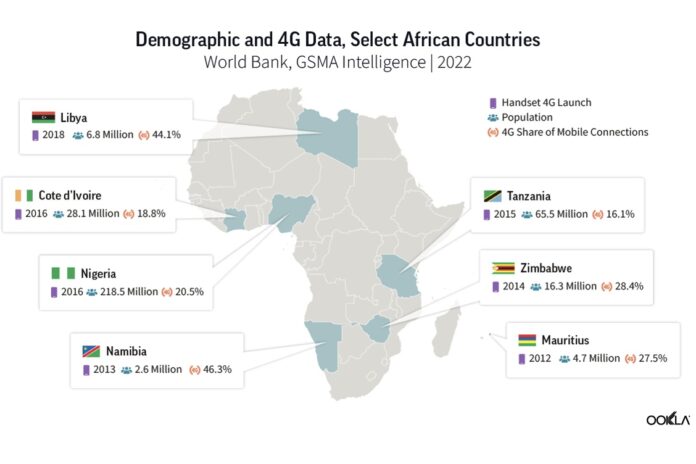This is based on analysis of Ookla’s Speedtest Global Index from June 2020 to June 2023
Ookla has analysed results of its Speedtest Global Index between June 2020 and June 2023 and the drivers that contributed to its rise. It identified eight countries whose progress could provide lessons and best practices to help other operators and regulators bridge the 4G performance gap.
Ookla chose markets that offer strong growth potential for 4G, so where it accounted for less than 50% of connections at the end of 2022, according to GSMA Intelligence. They represent different sub-regions of the continent and have different demographical and geographical characteristics, as shown on the map above.
The main findings from the analysis are:
• Government and policy intervention are critical in supporting the roll-out of 4G networks in Africa. More than ever, they need support amid the challenging macroeconomic operating conditions and consumers’ having less disposable income. For example, the government intervened in Nigeria to cancel excise tax to reduce operators’ financial burden, promoted infrastructure sharing in Cote d’Ivoire and Zimbabwe to speed up network deployment, and led the expansion of 4G infrastructure in Libya.
• Spectrum availability is crucial to improving network performance and coverage. For example, public authorities encouraged the efficient spectrum usage by freeing up legacy bands and refarming ones in use in Mauritius, Namibia, and Tanzania, and by adopting technology-neutral spectrum licensing in Zimbabwe.
• Introducing network QoS policies, without penalties for non-compliance, can help drive investments and promote fair competition. Policymakers and regulators in Africa are increasingly adopting alternatives to financial sanctions to encourage operators to meet coverage and QoS obligations. For example, the regulator in Tanzania mandated network investments instead of issuing non-compliance penalties.
Ookla concludes from these and other examples cited in the analysis that governments and regulatory authorities are crucial in making mobile data services more accessible in Africa.
Helping operators overcome challenges like the availability of spectrum, expanding coverage requirements, and offering affordable handsets will also be important with the next phase of 5G development.



